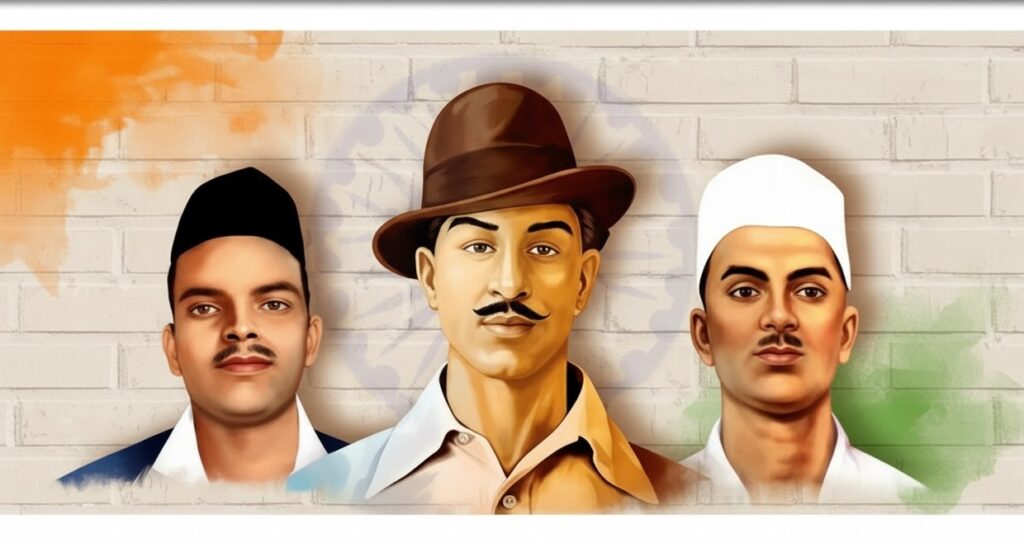Trending

Shaheed Diwas commemorates the ultimate sacrifice of Bhagat Singh, Rajguru, and Sukhdev, who were executed by the British in 1931. Their daring actions and revolutionary spirit established them as enduring emblems of patriotism in India. Bhagat Singh opposed not only colonial tyranny, but also deep-seated social problems including superstition, casteism, and injustice.
This article seeks to explore Bhagat Singh’s revolutionary beliefs and demonstrate their relevance to today’s youth. It inspires young people to take responsibility for driving social change by drawing on his courage, vision, and commitment to a decent society.
Bhagat Singh, Rajguru, and Sukhdev were more than just revolutionaries; they were also visionaries for a liberated India. They committed numerous revolutionary activities while battling the harsh British authority. Notably, to punish the British’s savage lathi assault on Lala Lajpat Rai, Bhagat Singh and his colleagues executed British officer Saunders.
They then protested the British government’s persecution by tossing bombs into Parliament’s assembly hall. However, this strike was not intended to kill anyone, but rather to rouse up the British. They bravely presented their case in court and smiled as they accepted the death penalty.
On March 23, 1931, Bhagat Singh, Rajguru, and Sukhdev were executed. Their deaths, however, did not put an end to the movement; rather, they fuelled it. Their sacrifice is indelible in the history of India’s liberation movement.
Bhagat Singh was more than a revolutionary; he was also a thinker and social reformer. Through his beliefs, he redefined patriotism:
Patriotism and Revolution: For Bhagat Singh, patriotism was more than simply slogans; he aimed to create a socially just and exploitation-free India.
Education and Free Thought: He believed that education and rational thinking were critical to the advancement of civilization.
Socialism: He was a staunch supporter of equal wealth distribution and justice for the ordinary people.
Statement Against Religion, Caste, and Superstition: He believed in no religion, caste, or superstition. He believed in humanity over religion.
Bhagat Singh’s opinions provide many valuable lessons for today’s young:
Bhagat Singh pushed young people to become involved in social revolution rather than only pursuing education and employment. He thought that youngsters must step forward to transform society and speak out against injustice. Even today, when faced with a variety of social and political concerns, the youth should not be passive. They should express their thoughts, take the initiative on social reform, and help to strengthen democracy. Youth should join in movements, voluntary work, and social service to help the country prosper.
Bhagat Singh emphasised education and scientific thought. He was against superstition, rituals, and old traditions. He believes that a society founded on logical thinking and science is the ultimate path to progress. In today’s world, young people should not limit themselves to bookish knowledge but instead embrace a scientific mindset. They should resist falling prey to societal rumours, fake news, and superstitions, and instead seek the truth. Education should be used not only to further one’s profession but also to promote national development.
Bhagat Singh used his thoughts and deeds to combat corruption, superstition, and social injustice. Corruption and social inequality continue to exist in many places of India today. Youth must take a bold stance against these. It is the responsibility of today’s generation to combat the forces that perpetuate caste and religious discrimination. Youth are responsible for raising their voices against corruption, working for a more transparent system, aiming for social equality, and combating all forms of injustice.
In today’s digital age, accessing information is simple; but, acting on that information is more crucial. Bhagat Singh did more than just express his beliefs; he acted on them. Today’s kids are frequently observed engaging in passive debates on social media, but real-world action is few. Youth must assume responsibility as voters, participate in social projects, and contribute to the country’s advancement. Instead of being inactive and moaning about the situation, young people can take action and set a good example for others.
Bhagat Singh, Rajguru, and Sukhdev’s sacrifice continues to inspire future generations, reminding us of the importance of patriotism. Their progressive ideas and fearless acts have the ability to direct today’s young towards real social change and responsible citizenship.
As Adv. Abdul Mulla correctly observes in his publications on platforms like www.lifeandlaw.in and www.asmlegalservices.in . The legacy of these martyrs is best honoured not by slogans, but through conscientious efforts for justice, change, and active civic involvement.
Adv. Abdul Mulla (Mob. No. 937 007 2022) is a seasoned legal professional with over 18 years of experience in advocacy, specializing in diverse areas of law, including Real Estate and Property Law, Matrimonial and Divorce Matters, Litigation and Dispute Resolution, and Will and Succession Planning. read more….
Copyright BlazeThemes. 2025